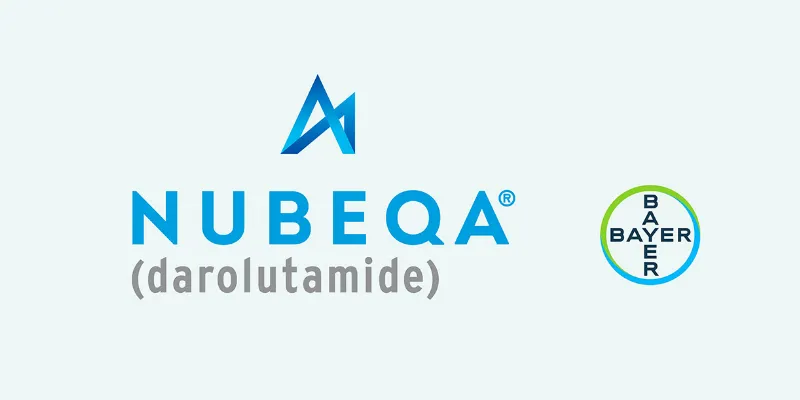New Data Confirms Darolutamide’s Safety and Efficacy in mHS Prostate Cancer

14 February 2025
New subgroup analysis from the Phase III ARANOTE trial shows that darolutamide (Nubeqa) plus androgen deprivation therapy (ADT) improves radiological progression-free survival (rPFS) in patients with high- and low-volume metastatic hormone-sensitive prostate cancer (mHSPC) compared to placebo plus ADT.
Findings presented at the ASCO Genitourinary Cancers Symposium (ASCO GU 2025) demonstrate significant improvements in rPFS, offering a promising treatment option for patients.
Stronger Evidence for Darolutamide in mHSPC
The latest analysis from the ARANOTE trial revealed that darolutamide combined with ADT reduced the risk of radiological progression or death by 40% in high-volume mHSPC and by an impressive 70% in low-volume disease when compared to placebo plus ADT. These findings build upon previous ARANOTE data presented at ESMO 2024, which showed a 46% overall reduction in the risk of progression or death.
“These latest findings from the ARANOTE trial, provide further evidence of the strong efficacy and consistent safety profile of darolutamide plus ADT in mHSPC across both high- and low-volume disease, whether used with or without docetaxel,” said Dr. Fred Saad, Principal Investigator of the ARANOTE trial. “This robust data reinforces darolutamide’s potential as a foundational treatment option for physicians, providing, once approved, flexibility to tailor care with or without chemotherapy while addressing the diverse needs of prostate cancer patients.”
Key Findings from the ARANOTE Subgroup Analysis
In the ARANOTE trial, 669 patients were randomized 2:1 to receive darolutamide plus ADT or placebo plus ADT. High-volume disease was defined based on CHAARTED criteria, which include visceral metastases and/or ≥4 bone metastases, with at least one lesion beyond the vertebral column or pelvis.
- Low-volume subgroup: Darolutamide reduced the risk of radiological progression or death by 70% (HR 0.30; 95% CI 0.15–0.60), with median rPFS not yet reached.
- High-volume subgroup: Darolutamide reduced the risk of radiological progression or death by 40% (HR 0.60; 95% CI 0.44–0.80), with a median rPFS of 30.2 months, compared to 19.2 months with placebo.
- Additional benefits: Darolutamide delayed time to metastatic castration-resistant prostate cancer (mCRPC) (HV: HR 0.46; 95% CI 0.36–0.60; LV: HR 0.21; 95% CI 0.12–0.37) and time to prostate-specific antigen (PSA) progression (HV: HR 0.34; 95% CI 0.25–0.46; LV: HR 0.19; 95% CI 0.10–0.37).
- PSA response rates: More patients achieved PSA levels below 0.2 ng/mL with darolutamide compared to placebo (HV: 54.6% vs 15.5%; LV: 82.6% vs 25.4%).
Treatment-emergent adverse events were minimal and consistent across subgroups, reinforcing darolutamide’s tolerability profile.
“This includes not only improving survival and significantly slowing down progression of the disease but also ensuring patients can maintain their daily activities with minimal interference by other medications,” said Christine Roth, EVP, Global Product Strategy and Commercialization and Member of the Pharmaceuticals Leadership Team at Bayer.
Age-Related Findings from ARASENS Trial
Complementing the ARANOTE results, a subgroup analysis from the Phase III ARASENS trial assessed darolutamide’s efficacy in combination with ADT and docetaxel across different age groups. Data from 1,305 patients showed that darolutamide’s benefits were consistent in patients younger and older than 75 years, with improvements observed in:
- Overall survival (OS)
- Time to mCRPC
- Time to initiation of subsequent therapy
Notably, darolutamide demonstrated a favorable safety profile in both age groups, with treatment-related adverse events remaining comparable between younger and older patients.
Darolutamide is already approved in mHSPC, under the brand name Nubeqa™, in combination with ADT and docetaxel in over 80 markets around the world. The compound is also approved in combination with ADT for the treatment of patients with non-metastatic castration-resistant prostate cancer (nmCRPC) who are at high risk of developing metastatic disease in more than 80 countries around the world.
Approval submissions are underway for a third indication of darolutamide, in combination with ADT, without the addition of docetaxel, for the treatment of patients with mHSPC. Darolutamide is developed jointly by Bayer and Orion Corporation, a globally operating Finnish Pharmaceutical company.
Darolutamide’s Potential in mHSPCT
Prostate cancer remains the second most common cancer in men, with mHSPC posing significant treatment challenges. Current estimates indicate that only 30% of those diagnosed with mHSPC survive five years or longer. The majority of cases progress to mCRPC, where long-term survival options remain limited.
About Darolutamide (Nubeqa)
Darolutamide is an oral androgen receptor inhibitor (ARi) designed to block androgen receptor function and slow prostate cancer growth while minimizing side effects. It has low potential for blood-brain barrier penetration, reducing drug interactions. Ongoing trials are evaluating its efficacy in various prostate cancer stages. The Phase III ARASTEP trial assesses darolutamide plus ADT in high-risk biochemical recurrence, while the DASL-HiCaP trial, led by ANZUP, investigates its use as adjuvant therapy for localized prostate cancer with high recurrence risk.











Comments
No Comments Yet!